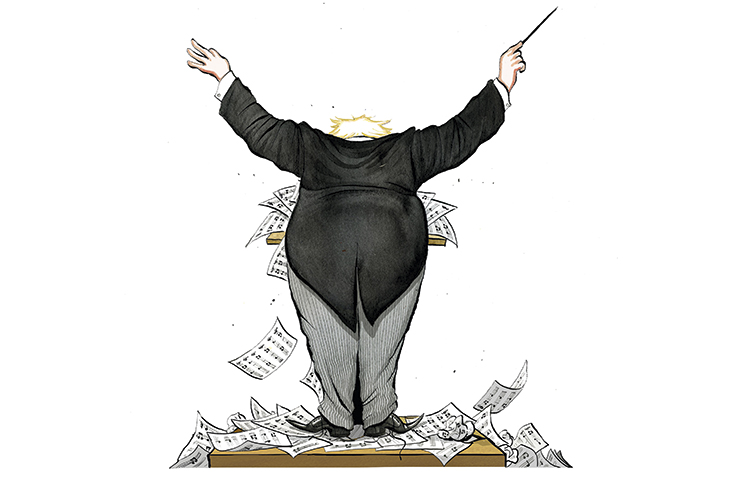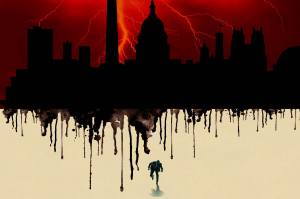‘I’m going to stick ruthlessly to script,’ says Boris Johnson. ‘This is not the stage of the campaign when you innovate.’ He’s right to worry about the timing. The new Tory leader won’t be chosen for just over two weeks but the ballot papers go out this weekend. Boris is the odds-on favourite. This is the most important week of the campaign and he’s determined to come across as a serious, game-changing leader, not the loveable yet unreliable joker.
The old Boris would mess up his hair before going on television. Today, when we meet in his House of Commons office, he quickly puts on a jacket — as if getting dressed for a job interview. He’s making a sales pitch. ‘Years of watching this thing decay, three years of drift and dither, have filled me with not just an understanding of government but also a very clear picture of how to get it done,’ he says. ‘My determination burns with a magnesium brightness to get it done and to deliver.’
The ‘it’, of course, is Brexit, which he defines as leaving the EU on October 31, come what may. But how? He has been accused of being light on detail — something Jeremy Hunt, his opponent, has sought to exploit by setting out a detailed no-deal plan. Boris says he also has a plan and offers four points. The first: to legislate to protect the rights of all EU citizens living in the UK. Next, to compensate the farmers who might be affected by a no-deal Brexit. Thirdly, to prepare small businesses who export to the EU to get ready for a new regime of heavier paperwork should no deal happen. Finally, restore power-sharing to Northern Ireland — something that is, he admits, easier said than done.
If there is a no-deal Brexit, he says, the UK will be ready. ‘And don’t forget that we will also have £39 billion, notionally, with which to lubricate any problems that remain. That’s quite a substantial sum.’ So the UK has everything needed, he says, to escape the flytrap of the EU by November. ‘Talking to people in this country, even talking to businesses, people feel that they have had enough of being told they can’t do things. They have had enough of being told this country is not up to it. They want to get on and do it. That will be our salvation.’
The salvation of the Tory party, he says, will be focusing on the wider problems exposed by Brexit. “Loads of people in parts of rural Britain or urban, Oppidan Britain found a sense that their lives and their futures weren’t as important,” he says. “That is totally wrong. There is a big, big opportunity to bring the country together.” So he’s the candidate for Oppidan Britain. But what on earth does that mean?
The answer lies in Eton, where Boris was a King’s scholar. His school fees would have been a fraction of those for most other pupils, known as Oppidans. There was always rivalry between the two: in school, and after. A pitch for the ‘left behind’ Oppidans might help bring the Tories back together, reaching out to David Cameron and Rory Stewart (both Oppidans).
But what about the rest of the party? ‘I’ve been talking to a lot of colleagues, as you can imagine, from all wings of the party in the last few days,’ he continues. ‘I do believe that common sense is breaking out.’
The biggest dividing line among Tories has been the idea of a no-deal Brexit. Jeremy Hunt has said he’ll decide in September whether to pursue it — which, to Boris, would be way too late. ‘It seems to me to be the height of folly,’ he says. ‘Why wait? If we are going to be carrying out negotiations throughout August and September, which of course we will be, it seems folly not to be preparing for no deal at the same time.’ Delay, he says, ‘totally robs the UK of conviction during the negotiations’. Boris believes that by making it clear that the country is prepared to walk away, Britain will change the dynamics of the negotiation and lead to the EU making concessions.
He says that Britain was ready to leave the EU without a deal on March 29 but the government lost its nerve. ‘The greyhounds were pretty much straining in the slips as we came up to the end of March. People were ready. The machine was poised, then everybody was stood down. The Grand Old Duke of York marched her troops down again. As a result there was a sagging in the level of readiness.’ A mistake that he says he won’t repeat. ‘We have to be ready to come out and we have to prepare now.’
One of the most striking things about Boris is how utterly convinced he is that preparing for no deal will prevent it. He tells us with a pained look on his face that ‘I do not want a disruptive or disorderly no deal — everybody gets that and I’ve said that many, many times. I don’t want us to crash out but we must prepare for that eventuality and start preparing now and not wait a couple of months.’
Only Brexit, he says, can heal the divides of Brexit. ‘We haven’t allayed the divisions, we haven’t made them better. We haven’t healed the rift by delay. We’ve made it worse,’ he says. ‘The wrangling has intensified because of the uncertainty over the direction of travel. Like any, erm … domestic.’ Perhaps understandably, given recent events, he abandons the analogy.
He deals with questions about his private life — and any ‘domestic’ — by stonewalling. Interviewers have now stopped asking. He has replaced his usual tactic of responding to questions with long, digressive answers with making short points, even one-word replies. Are there any circumstances where he’d build a wall at the Irish border? ‘No.’ So the only way there would ever be hard infrastructure on that border is if the Irish government builds it? ‘Correct. Correct.’ Could he not make more of that, given how worried many are about a hard border? ‘Well, I am. There can be no more powerful clarion, there could be no more vivid advertisement of that than through the pages of The Spectator!’
In Boris Johnson’s mind, the question of how the UK and the EU solve the Irish border question is ‘going to be the shape of the answer to the entire problem of how the UK can come out of the EU while retaining frictionless trade’. He says that the Irish border is ‘simply in microcosm, the problem that will be expressed at every UK/EU frontier when we come out … what is essential is that we are not locked in the customs union, not in the single market’. He then adds with glee that ‘the current withdrawal agreement is, as they say in Brussels, “caduque”’ — null and void.
The biggest policy misfire of his campaign so far came when he used his Daily Telegraph column to pitch a plan to cut tax for higher earners by raising the 40p threshold from £50k to £80k. For this he was attacked by Ruth Davidson, the Scottish Tory leader, who said the low-paid should be first in line for a tax cut. He says he isn’t in the mood to be ‘dragged into a conversation about the top rate’ again but he does voice surprise at the backlash. ‘I’m amazed this should be a taboo subject in the Conservative party.’
Davidson’s reservations over Johnson go further than tax cuts. Scottish Conservatives worry that he could prove a flop with voters north of the border. For his part, Johnson remains optimistic. He dismisses a recent poll that gave him a -37 approval rating in Scotland – behind Nigel Farage – on the grounds that he was greeted warmly when he visited Aberdeen. ‘Actually I went up to Scotland quite recently and found I had an extremely warm reception wherever I went,’ he says. ‘I’m very suspicious of this data.’
He hopes to help Davidson by delivering a Brexit which, he says, will strengthen the union by making separation less attractive. ‘The SNP, post-Brexit, will be launched on an entirely quixotic campaign to lead Scotland back into the EU, into the euro, into the Schengen group, under the whole panoply of EU law. The SNP will be logically committed, post-Brexit, to giving up control of Scottish fish again. I really can’t see that as a winning electoral proposition in Scotland.’
With Brexit done, he says, he’d then seek to unite the party and the country with his version of liberal Conservatism. ‘Once we’re over the line, clarity will descend,’ he says. ‘We’ll be able to get on with the fantastic agenda of bringing the country together with a program of what I call modern Conservatism, what we used to call “One Nation Conservatism”. It is very, very simple and is based on the idea that a dynamic free-market economy is indispensable for delivering fantastic public services. And that fantastic public services are indispensable for a dynamic market economy. It is not a difficult sell.’
He is now promising to cut National Insurance for the low-paid and raise the minimum wage. When asked why food bank use is rising, he returns to the theme. ‘The answer is we need higher pay. If I am lucky enough to be prime minister, I want to bring the country together. Look at what we did in London — it remained the powerhouse of the UK economy, it remained the most productive region in Europe. But what also happened was people at the bottom end got richer faster. Their life expectancy increased, as a proportion more than those at the top. That’s what we should be doing. You can have both.’
‘We have to do three things: deliver Brexit, unite the party, unite the country and defeat Corbyn. And I think I am best placed to do all three.’ He says that being an election winner is his ‘true selling point’ and that as prime minister he would be able to make the case for Conservatism. ‘For three years, we have failed to get across why we believe in free markets,’ he says. ‘We have failed to articulate the case for enterprise. In fact, it’s been a massive missed opportunity: we’ve failed to make the case for business. That is the opportunity that we have now — to show the British public what they instinctively understand.’
‘We need to sell that again to the British people, then wallop Corbyn for six. As I never tire of telling everyone — and I must get this key point over the line — the last time I had to fight an emanation of the London Labour left, I beat him when our party was 17 points behind.’
So the three things that we have to do are to deliver Brexit, unite the party, unite the country and defeat Corbyn. I think I am best placed to do all three.’ Or, in this list, four – but who’s counting?
But Boris’s problem is that, now, a great many people are counting as well as costing his various promises and digging up comments he made as a journalist. Often in articles he wrote for this magazine, which he edited from 1999-2005. Rather than defend each article, Boris has responded by asking for forgiveness for anything that he has written before he came to office that might have caused offense. A departure from the last article he wrote as editor of this magazine was to rail against apology. “‘The Spectator surrenders to no one,” he said. “The Spectator is always right’. Why has he changed his tune?
‘I wasn’t entirely consistent I must say during my time at The Spectator,’ he sighs. ‘I remember I wrote a cover story in which I apologized to various bollards in Liverpool.’
As prime minister, Boris wants to be the enemy of the nanny state. He wants to review puritanical ‘sin’ taxes, such as the sugar tax. What about health regulations that stop many restaurants serving rare burgers? ‘Can you not order rare hamburgers now?’ he asks. ‘Why the hell not? That’s ludicrous, that can’t be true.’ This burning injustice would be swiftly addressed.
Despite his smart jacket and serious demeanor, there are still reminders of the old Boris scattered all over his office. A model bus sits behind him on the desk, an Olympic flag hangs on the wall, and a bust of Pericles lies on the floor. They all represent his qualifications for the job: his rhetorical talents, his record in London, his ability to inspire. There aren’t many mementos of his stint as Foreign Secretary.
Boris the politician is again familiarizing himself with the constraints that come with high office. His beloved bike has gone — ‘banned,’ he says, by his team. His security detail could soon be back to exercising alongside him. ‘God they were patient to run at the pace of a very elderly man,’ he says.
He’s not looking forwarding to returning to ministerial cars, as he doesn’t like the air con: ‘You can’t open the windows because they are all armor-plated.’ Sensing that he has drifted off message, he quickly declares that this hardship would be ‘a small price to pay for the opportunity to deliver Brexit by October 31, to unite our party and our country and to get ready to defeat Jeremy Corbyn.’
This article was originally published in The Spectator magazine.


















